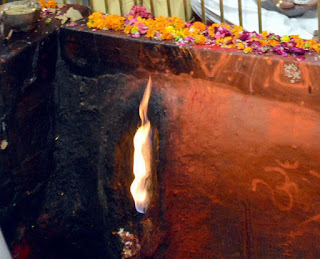Shree Madbhgwad Gita Rahasye Saster
Description:-[There is a difference of. opinion as to how the words 'paryapta' and 'aparyapta' are to be understood, 'paryapta' ordinarily means 'sufficient'. Therefore, some interpret this stanza as meaning, " the army of the Pandavas is sufficient, and our army is insufficient[1] ". But, this interpretation is not correct. In the foregoing chapters of the Udyogaparva, Duryodhana, while describing their army to Dhrtarastra has given the names of the above mentioned commanders of his army, and has said :-
"As my army is very large and well-trained, I am bound to win the war "[2] ; similarly, when Duryodhana again describes his army to Dronacarya, further on in the Bhismaparva, he has uttered the words of the above stanzas of the Gita[3] ; and as this description has been given in a joyful frame of mind, in order to encourage the whole army, the word 'aparyapta', cannot possibly be interpreted otherwise than as meaning 'unlimited', 'bound- less', or ' innumerable '. The root meaning of the word 'paryapta ' is 'that which is capable of being surrounded,[4], on all sides[5]'. But, when the word' 'paryapta', is used after some word in the fourth (dative) case, as in 'for a particular purpose, paryapta', or 'to some person (or thing), paryapta', then the word 'paryapta', means 'that which is sufficient for, or capable of performing that particular purpose' ; and if there is no word before the word 'paryapta', it, by itself, means 'sufficient', 'limited', or 'countable'. For instance, take the words 'grasun takanya sarakhem' (that which is capable of over-whelming) in the Marathi language, which are synonymous with the Sanskrit, word 'paryapta'. "When you say 'amakyala grasun takanya sarakhem', (that which is capable of overwhelming some thing or some one), it means that it is 'sufficient for him or it', and remains over; but, if you simply say 'grasun takanya sarakhem ', it means that 'some one else can over whelm it'. In the present stanza, as there is no word before the word 'paryapta', this latter meaning is the correct meaning ; and the Brahmanandagirl commentary gives illustrations of the word being used in that sense in books other than the Bharata.
The explanation given by some, that Duryodhana, getting frightened, says that his army is 'aparyapta', that is, 'insufficient', is not correct ; because, there is no description anywhere of Duryodhana having got frightened ; on the other hand, it is stated that the Pandavas arranged their army in the military array known as Vajravyuha, because the army of Duryodhana was large ; and that, Yudhisthira was dejected at seeing the huge army of the Kauravas[6]. The reason for saying that the Panda va army was 'protected by Bhima', .'although, Dhrstadyumna was.' the Generalissimo, is that Bhima had been posted in the front of of the Vajravyuha, in which the Pandavas had arranged their army- on the first day of the war, for protecting it; and because he was the only person whom Duryodhana could see in the forefront as the protector of the army.[7] ; and that is why these two armies have been respectively described as 'bhimanetra' (of which, Bhisma is the eye) and 'bhismanetra' (of which, Bhisma is the eye ) in the chapters of the Mahabharatax


टिप्पणियाँ
एक टिप्पणी भेजें
Thank You For Kment